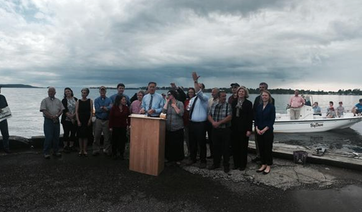On June 17, 2015, Governor Peter Shumlin signed into law the legislation that would put the wheels in motion for cleaning up Vermont’s lakes and waterways. The Clean Water Act is designed to enact multiple statues related to water quality in the State. In doing so, small, medium, and large farms will have new annual registration fees, fees on non-agricultural fertilizer that is distributed within the State, and increased fees on pesticide products. The agricultural fees will be used to pay for new water quality staff positions.
The act requires owners and operators of farms to be trained on prevention of discharges to waters; mitigation of storm water runoff; land application of manure or nutrients; and nutrient management planning. The act amends several provisions regarding agricultural water quality by creating “required agricultural practices (RAPs).” Beginning on July 1, 2017, small farms shall certify compliance with the RAPs.
The Act also amends or establishes water quality requirement to be implemented by the Agency of Natural Resources. Some of the requirements are: developing a schedule to update the 15 watershed basin plans, regulate storm water, and storm water permitting including municipal roads.
There will be established a State Clean Water fund for a capital budged that includes $6.75 million for technical assistance and direct investment in water quality projects in the Lake Champlain Basin and around the state. According to Governor Shumlin, “This includes $1.6 million in state matching funds which will leverage $8.2 million in federal EPA grants for a total of $9.8 million for low-interest loans to municipalities through the clean water state revolving fund. The capital budget also increases to $3.75 million funding for innovative storm water management projects, and $1.4 million in funding for the Agency of Agriculture’s cost sharing program for livestock fencing and other agricultural practices. The Transportation bill also includes $3.2 million for storm water retrofits and other projects to reduce polluted runoff from our back roads. To assist communities and partners in restoring and protecting Vermont’s waterways, Act 64 sets up a Clean Water Fund to be funded with a 0.2 percent surcharge on the value of property subject to the property transfer tax.”
When calculating the 0.2 percent surcharge, no surcharge is assessed on: the first $100,000.00 in value of property used as a transferee’s principal residence; or the first $200,000 in value of property transferred if a purchaser’s mortgage is funded by the Vermont Housing Conservation Trust Fund, the Vermont Housing and Finance Agency, or U.S.D.A. Rural Development. The surcharge is deposited in the Clean Water Fund and is repealed on July 1, 2018.
DOWNLOAD PRESS RELEASE: GOVERNOR SIGNS CLEAN WATER BILL
By Katrina Spaulding
Vermont Realtors®
Advocacy and Development Director
Email: katrina@vermontrealtors.com



